2014 has come and gone, with many a list coming in it’s wake. As I did last year though, instead of the average “Top 10 Movies” list, I elected to spotlight a few individual noteworthy moments and discuss them in depth. As with before, “noteworthy” doesn’t necessarily mean all of these scenes are worth praise or will receive any. These are merely moments I thought were worth spotlighting, whether for a good or bad reason. Plus, these are only the opinions of the author listed and not of OneOfUs as a whole. They will also be littered with SPOILERS and the list isn’t nearly as comprehensive as I’d like it to be, even with four more moments than usual. With all that said, here we go with the list.
The Babadook: The Bad Book

2014 wasn’t a strong year for horror films, with more Annabelles and Devil’s Dues than one can honestly muster sitting through. The most noteworthy examples of the genre came from overseas, particularly with the Australian psychological horror of The Babadook. Accurate to it’s anagrammed name, the titular character comes from the phrase “a bad book” which is how the entity is introduced to Essie Davis in storybook form. She later picks the book back up after it reappears at her door and reads it further, only to find a haunting harbinger of doom for her family inside. It’s the defining moment of the film visually, showcasing the cartoonish but still sickly off putting illustrations of the book that end up feeding into the more disturbing imagery and plot machinations of the third act. It’s the point where the supernatural elements come to fruition, while at the same time keeping the lines of reality blurred in order to keep the audience on it’s toes, like any great horror should.
Guardians of the Galaxy: Come And Get Your Love
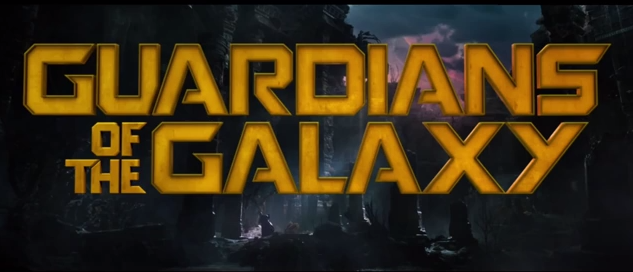
Trying to follow up a very weighty dramatic scene of a boy being abducted by aliens after his mother suddenly dies from cancer with a scene that sets up the lighthearted offbeat comedic sensibilities of the film overall is really hard to pull off. Luckily, James Gunn did it in spades with the opening title sequence of this summer’s beloved blockbuster hit Guardians of the Galaxy. Perhaps it helps to have a talent as charismatically inclined as Chris Pratt on camera to sell the care free goofiness of Peter Quill, but the use of Redbone’s “Come And Get Your Love” and the swooping camera shots as Star Lord lip syncs to the classic 70s tune. It perfectly sets the audience up for the off kilter tone of the piece while endearing them to Peter even more after the tragic events of his past. Plus, that title shot is just damn brilliant, showcasing our hero as a small part of an even grander universe far before we even reveal his station in life.
Maleficent: The Forehead Kiss of… Love?
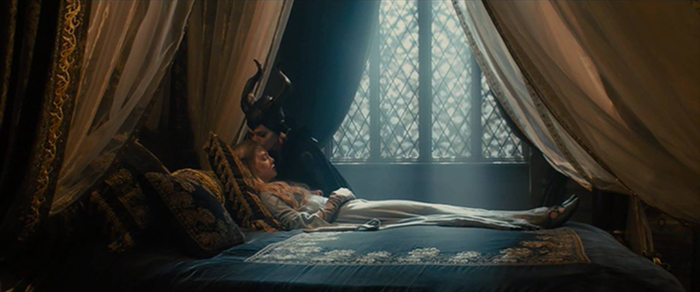
In a year of many a corporate mandated revamp of older material, Maleficent is one of the more transparently cheap examples. Taking one of the more recognizable villain characters in Disney history and giving them a more sympathetic spin is one thing. Then again, taking said character and applying the most flimsy uncreative attempts at character development to her that completely negates anything that represents the history of that character is another. Case in point, the moment where Maleficent becomes a hero and brings Aurora back with a kiss that not even our story’s Prince could accomplish. Not a tragic protagonist who creates her own fate or even an anti-hero with complex moral actions. Instead, she’s just a hero who wants the titular protagonist to live rather than live up to the evil nature of the character that people enjoyed about the character. It’s a real shame when you realize that the 90s live action adaptation of 101 Dalmatians looks like less of a lame retread by comparison. At least Glenn Close’s version of the character tried to kill puppies at the end of the day. Maleficent can’t even live up to her relative namesake. Instead, she falls completely in surrogate mother love with this girl and gives her the totally undeserved twist on “true love’s kiss”, especially when the relationship between the two of them really meant nothing at the end of the day.
Dear White People: The Halloween Party

Dear White People is hysterical, rich in character and filled with charming performances… but it’s far more than that. Dear White People is a political cartoon of the time we live in; slightly exaggerated, but more sharp and biting than most any current exploration of race relations from multiple perspectives. In fact, despite it’s seemingly pointed title, the film is actually targets multiple races that feed into stereotypes and sell out their culture. All of this reaches its boiling point during the climax, where a white fraternity on the campus of the prestigious predominantly white Winchester University holds a blackface themed party that raises the eyebrows of the school’s entire minority population. It’s a scene that showcases the ignorance of our generation, with offensively awful costumes disguised as jokes and ugly stereotypes celebrated as virtues to live up to. The confrontation is more than a mere Animal House style college party gone wrong; it’s the kind of rebellion that means something more grounded and important in terms of cultural appropriation & fighting back against it, but in a way that still feels appropriate for the characters, such as when Tyler James Williams free-style rap or when Sam gets the monumentally important pieces of footage for her project. It manages to tell a lesson that should be preached to all in a package that doesn’t lose the narrative. Perhaps Spike Lee and Oliver Stone should watch this one carefully.
The Lego Movie: Basement Father/Son Talk
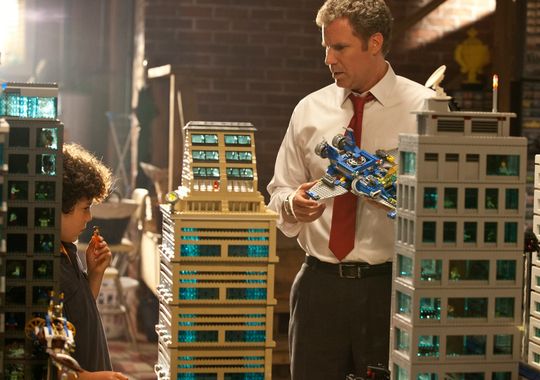
The Lego Movie was a surprise for many obvious reasons, mainly that it was as charming, clever and gorgeous as it ultimately was. Yet, perhaps the most surprising individual moment is the sudden turn from gorgeous stop-motion-esque CG animation to live action as Will Ferrell (the voice of our main villain Lord Business) finds his young son playing with his LEGO models. It’s a shock one needs a bit to get over, but is made all sorts of worth it when Ferrell discovers the creative scenarios of the film are his son’s own creation and that he shouldn’t stifle his creative mind. In this very zany and irreverent comedy, it’s a poignant and beautiful moment between father & son that works both as a parallel to the main conflict resolution of Business and Emmett, but also as a deeper look into the idea of imagination and how it can connect those of different generations. Who knew a movie where Batman sings about his darkness in heavy metal style could be so layered?
A Million Ways to Die in the West: Neil Patrick Harris Relieves Himself
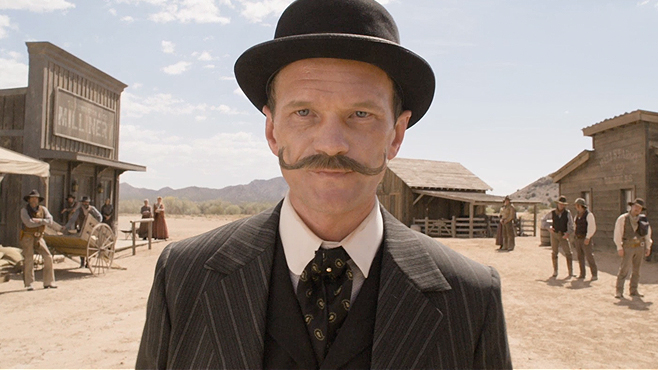
In a year with it’s fair share of disappointments, Seth MacFarlane’s A Million Ways to Die in the West hit hardest for me because I had recently gained a bit of hope for MacFarlane. After the surprisingly fun and investing Ted, I was hopeful that MacFarlane’s follow up set in the Old West would be another enjoyable ride that would distract from the ever increasing disdain for Family Guy. Instead, we got another mess of mean spirited hollow dreck from MacFarlane that had all the lack of story, unbelievably flat characters and horrendously one note jokes that last far too long of a Family Guy episode for feature length. Case in point, the scene where Neil Patrick Harris attempts to face off against MacFarlane in a duel, but-due to his drink being spiked the night before-he experiences dysentery and is forced to relieve himself in one of the dual bystanders’ hats for a solid minute long shit joke. A joke that signifies MacFarlane’s true lack of comedic timing and wit that doesn’t even have the decency to end at the appropriate time, which Seth mostly managed to avoid in Ted. It’s this laboriously tedious extended bad joke that never ends… much like the film itself with it’s bloated 116 minute running time.
Whiplash; Andrew’s Solo
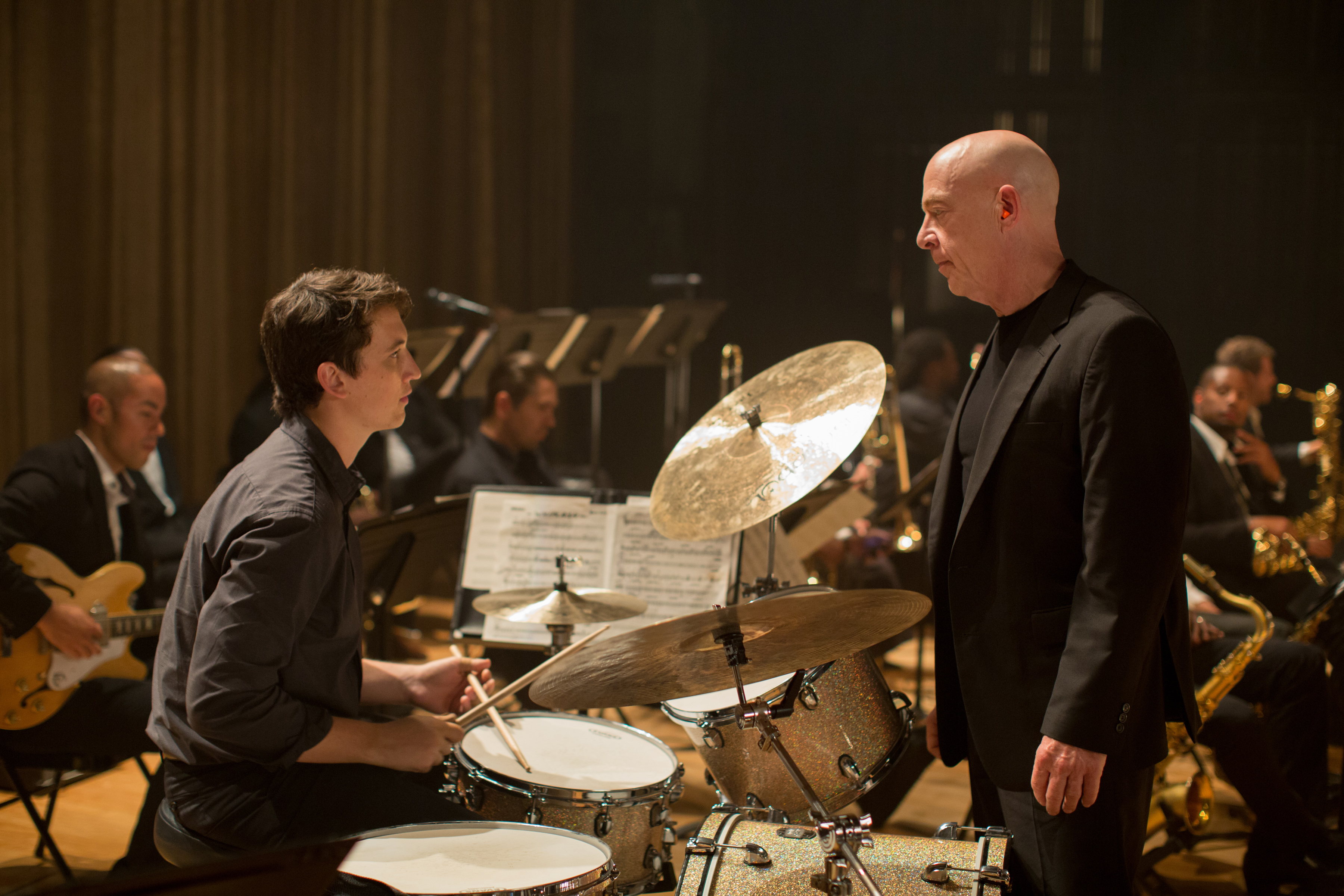
Who knew that jazz drumming could be this intense? With Whiplash, even the rehearsal sessions are treated as life and death situations, everything riding on the perfect synrinisticy of every single element coming together without an ounce of imperfection. All of this culminates in the climactic scene, where recently disenfranchised rookie drummer Miles Teller performs in front of the JVC festival concert conducted by his recently excised teacher and tormentor JK Simmons. It’s a once friendly opportunity turned volatile race for his future as Teller pulls out every single stop to impress the very prestigious crowd for the sake of his future as a musician while the odds are stacked against him by Simmons, who is either a vengeful prick trying to ruin Teller’s chances at succeeding or a brilliant teacher trying to push a pupil with clear talent to his full potential. It’s that ambiguous tightrope that gives this climax more life or death stakes than most of the “world ending” climaxes from 2014’s summer blockbusters. So much time has been invested in seeing Miles Teller put literal blood, sweat and tears into his drumming, which gives the fast paced intensity of the editing and the visual asides from both Teller and Simmons far more heart pounding than they have any right to be, but perfectly in tone with the immersive intensity of both the gorgeous piece of jazz music Teller is beating the hell out of and the character dynamics of the entire film overall.
The Raid 2: The Car Chase

For all it’s belabored plot issues and bloated running time, The Raid 2 is still one of the bigger cinematic achievements of the year. Every action scene is filled with more snapping limbs and gory deaths than any martial arts film of the last several years could ever conceive of. Probably the most innovative examples is the grand scale car chase fight scene, in which our hero is fights his captors in the car while his buddy chases after him. It’s not uncommon to see a dueling action scene, but the kinetic momentum of the choreography and editing for both the inner car fight and the car chase. The ballet of rhythm between the two sequences is violent and quick, but there’s a gorgeous artistry to every hit, every snap and every head crushing under a wheel, particularly with the overhead shot of the car that makes director Gareth Evans rival Alfonso Cuaron’s work on Children of Men with similar car rigs. It’s messy and chaotic piece, but it’s raw energy makes up way more for any of these meager faults. Plus, on a pure visceral level… Did You See How That Car Flipped?!
Winter’s Tale: The Fight Scene

On the opposite example of fight scenes, the romantic fantasy film Winter’s Tale is perhaps the worst for the entire year. In a film that already has the bizarrities of a flying horse, a love triangle based around thievery & consumption and Will Smith as Satan (no, really), everything culminates in this one gloriously dumb fight scene between Colin Farrell and Russell Crowe that has something to do with the overall plot of angels, demons and Satan or some such. The important thing to note here is that our big end of the second act face off between our main hero and villain involves a group of thugs who refuse to attack despite surrounding our main lead, the magical horse being sent away despite providing a clear escape for our hero and Crowe pulling the finishing move head butt that sends Farrell over a bridge to have amnesia. Now, if you’re confused by any of this, don’t worry; the whole film is this poorly constructed and relies on logic too unsound for cartoons. Yet, that’s what makes this moment and Winter’s Tale in general so notable. It’s a film so lacking in terms of competently wise decisions on any directorial, story or character level that still manages to be engaging only so you can see how much more of a trainwreck this can be, especially with a cast of talents like Farrell, Crowe, Smith, Jennifer Connelly & William Hurt all clearly doing favors for Academy Award winning screenwriter turned first time director Akiva Goldsman. It’s horribly awful glory should be seen by all.
Nightcrawler: The Car Confrontation
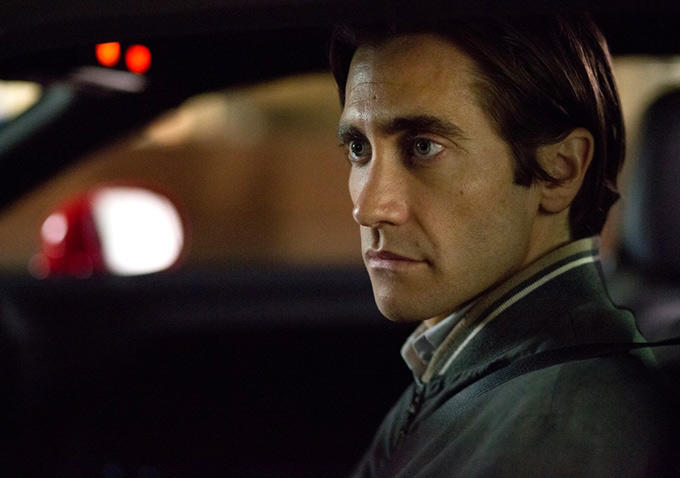
Nightcrawler is both a Network and Taxi Driver for our generation; a pitch black satire of news culture that’s also this darkly compelling character study of a determined gentleman with a desire for the American Dream at any cost. That man is Lou Bloom, brilliantly planned with an oozing sleaze and a determination that would be enviable if he wasn’t such a sick twisted bastard by Jake Gyllenhaal. That mixture of unsettling morals and begrudgingly admirable gumption is perfectly illustrated in a scene right before the climax of the film, where Lou is being berated by his partner in crime Rick Garcia for his lack of true people skills and brings up the possibility that his skills have little to do with understanding people so much as disliking them. The way Gyllenhaal delivers this line sends the worst sort of shivers down the spine, collapsing any sort of humanity the character may have had instantaneously as Rick sits back in the same static gaze of horror that anyone would naturally have. It’s the scene that earns Gyllenhaal all the praise on Earth for one of the most effectively disturbing performances of the last decade.
X-Men Days of Future Past: Saving Time In a Bottle
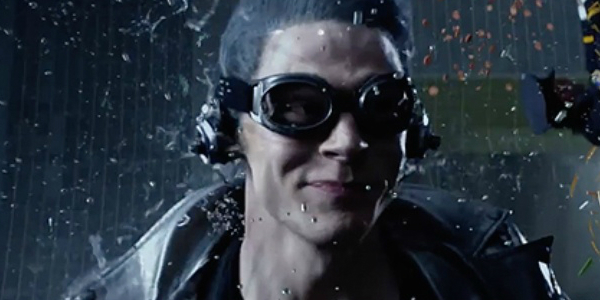
Of course I’d be remiss if I didn’t include this moment on here. Seeing Evan Peters slow time down to a crawl, going faster than the speed of time to mess with the various pentagon pieces of security so he can prevent his new found buddies from perishing while at the same time living up to his anarchist spirit is damn fun and probably the best sequence in any X-Men movie. Set to the perfect period song by Jim Croce, filled with immersive visual details and lead by the charismatic subtlety of Evan Peters, this scene is one of the few to really take advantage of this specific superpower in a superhero film, giving both Avengers: Age of Ultron and any DC adaptation with The Flash something to live up to. It does also present some potential issues to work out for X-Men: Apocalypse in terms of Quicksilver being able to resolve so much, but keeping the minor at his home is good enough an excuse as any for the time being. Let’s Ezra Miller pull off something this damn charming, DC!
Tusk: The Introduction of Guy Lapointe
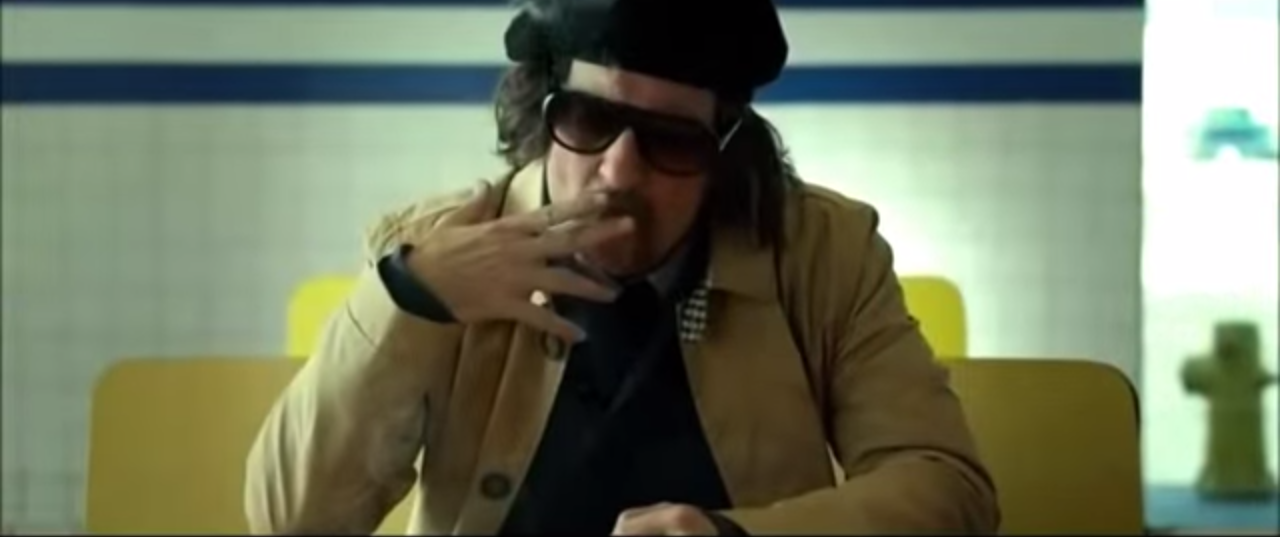
Tusk represents an important moment in the career of writer/director/podcast Kevin Smith. It marks the point where he officially stopped caring about making a film with any sort of real mainstream appeal and doing what he wants to do as a filmmaker. That’s all well and good… but the results were far more unpleasant than anyone could have anticipated. In the middle of this rambling and incoherent story of an ego driven podcaster (Justin Long) at the mercy of a crazed hermit (Michael Parks) that feels like it was written by someone who smokes marijuana frequently (an accurate description of Smith that he wears with a badge of honor), Johnny Depp shows up for an extended- and BOY do I mean extended-cameo as a French Canadian detective named Guy LaPointe who is sent in to retrieve our unbelievably unlikable hero. Decked out in his usual array of bizarre make-up, goofy mannerisms and over the top accent, Depp’s presence here signals that he, much like his director, doesn’t really care that much about what others will think of his awkward cartoonish caricature of an Inspector Clouseau-style bumbling detective, who goes on and on about his experiences trying to track down Parks in a scene so devoid of laughs or tension that it stops whatever momentum the movie has in it’s tracks dead in the water as the already ever flip flopping tone of Tusk had now destroyed any sort of engagement one could have with the story at hand. It’s the new textbook example of how not to introduce a character, as it manages to make the audience give even less of a damn than Smith or Depp does.
Enemy: The Spider

For most of it’s run time, Enemy is a very dreamlike thriller about dual identity, one of many films to do such a thing in 2014 along with The Double, The One I Love and Muppets Most Wanted. In this case, the double playing is done by Nightcrawler‘s Jake Gyllenhaal as a history teacher and an actor who look exactly the same, interacting and gradually taking over each other’s lives and sleeping with each other’s wives. Then, during the last minute of the film, it turns into a bizarre creature feature when one living Jake walking in on a giant spider in his bedroom, with Jake sighing in defeat. While spider imagery was admittingly foreshadowed, the bizarre nature of the spider makes this one of the strangest endings in recent memory. Hell, I’m still not sure what I think of it. So much interpretation has been applied to this film’s themes and ending (including this Slate article) that it can’t help but be memorable. It managed to make what was otherwise a well made but forgettable psychological thriller into something that can’t be erased from memory.
The Grand Budapest Hotel; Zero’s Epilogue
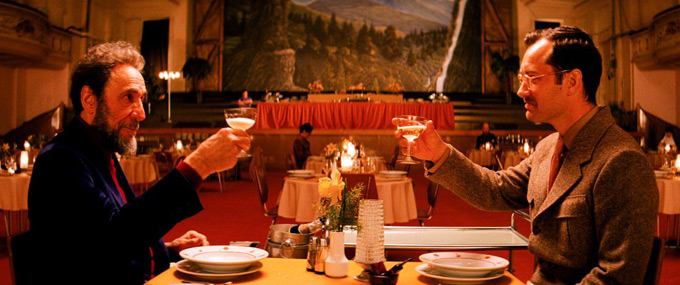
For most of it’s run time, The Grand Budapest Hotel is very much the average light and fun Wes Anderson style romp, with elaborate set designs, a star studded cast as eccentric characters and a cartoonishly elaborate plot that twists and turns at every moment. But, along with a few moments interspliced throughout the narrative, the film is bookended by very somber pieces about our main character Zero and the ultimate sad end of his journey. His mentor killed suddenly, his wife & infant son falling ill so quickly, the hotel ravaged by years of communist take over and time itself, all Zero has to show for it is a once grand hotel gone to mediocrity. It’s a seemingly bitter end to this energetic story of love, crime and passion that ran at the pace of a jack rabbit, but it’s an appropriate one. The story we saw was one painted with nostalgic memory, played up as one telling of real events to an author who turned it into a book for generations to read. The story itself, for however ridiculous and odd it is, will continue to inspire and entertain others forever, even after the Budapest rots and crumbles. It’s another use of meta narrative that makes Anderson one of the most consistently engaging filmmakers of our time. In the same way that the exterior of the Budapest (or the sets in any of Anderson’s films) looks like a dollhouse to see these characters play in, the stories carried out in that dollhouse will inspire and entertain for generations to come in the form of this book… or this film… or whatever remake we get of it in 50 years time. It just keeps on going.

